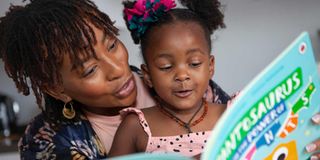The power of reading for pleasure

Better readers can come from any background as long as they are supported and provided with good books.
What you need to know:
- Apart from inciting and satisfying the curiosity of children, reading for pleasure complements their imagination and mental and social development.
In East Africa, now is the time to recognise the importance of reading for pleasure as a child. Research establishes that reading for pleasure is a gem in making children the best of themselves.
Apart from inciting and satisfying the curiosity of children, reading for pleasure complements their imagination and mental and social development.
On International Authors Day, marked on November 1, a grand event was held at the Aga Khan University in Dar es Salaam.
The necessity of reading for pleasure was one of the key matters discussed.
In delivering his keynote address, Dan Brockington, an ICREA research professor at the Autonomous University of Barcelona, Spain elaborated on how we can encourage children to read from the very early days when they are full of excitement about reading.
This passion can be developed in the family, and it has a sure hope of flourishing when children are provided with good books.
The secret, as Prof Brockington expounded, is not just reading, but reading fiction. Reading fiction for pleasure has been proven to boost educational performance in children.
Children who read fiction for pleasure frequently or habitually are much more likely to read above the level expected of their age.
Reading fiction for pleasure sharpens creativity and widens imagination as it arouses questions beyond the obvious things and immerses children into an experience of the narrated reality.
It develops in children the capacity to relate their lives to stories and paves the way for reasoned anticipation.
This is why, when Albert Einstein, the all-time science prodigy was asked by a mother what gift she should give to her child, he advised her to buy the child fairy stories.
This creative imagination is an indispensable intellectual equipment for any true scientist.
Moreover, fiction reading is a leveller, equalising the societal imbalances that have impacted education systems.
A child from a poor background, but who reads well, is likely to outperform many children from wealthy families at good schools.
While the tendency is that children from wealthy and elite backgrounds become better readers, better readers can come from any background so long as they are supported, motivated, and provided with good books.
East Africa in perspective
Tanzania
In East Africa, and particularly in Tanzania, there is a promising readership among children, especially because of the rising population demographics coupled with the organised efforts to form children into better fiction readers.
It is the opposite in the West, the UK and the USA for example.
In the latter, the number of children has been static, with no indicator of increment in the near future.
This means with time it will become harder to sell so many children’s books.
There is a lot of effort to promote a love of reading fiction among children in Tanzania.
Worth mentioning is the brilliant work done by the Tanzania Writers Forum (TWF) and the Children's Book Organisation (CBO).
Richard Mabala who is the chairperson of the CBO avers that CBO is a revamped version of the Children's Book Project which bought more than 300 books for thousands of Tanzanian children and revitalised the whole publishing industry.
“The project used a revolutionary and very effective technique of depending on Tanzanian creativity and expertise. Writers wrote, artists illustrated, designers designed, and publishers published. Those books that were considered good enough by a committee consisting of writers were guaranteed a market and the project bought 60 percent of the books and distributed them to the project schools. To make a decent profit the publisher then had to sell the remaining 40 percent in the open market. Aspiring and budding writers, artists and designers were also trained,” Mr Mabala explained.
“This model is now being revived and it comes at a crucial time when the need for interesting and enjoyable books is so obvious but there is a dearth of such books. I believe that the CBO can play the role again,” he added.

We can encourage children by reading to them or listening to them.
Nahida Esmail, a multiple award-winning children's fiction author and the vice-chairperson of the CBO shares her views as well.
“Promoting child literacy and reading is something that is close to my heart. My passion for writing is rekindled every time I see children’s eyes light up when they hear a story. I love to hear their varying thoughts on a particular story. It is my honour to be part of this mission to promote children’s literacy and the culture of reading in Tanzania. To be part of producing books that children enjoy reading,” she elaborated.
Kenya
Gloria Minage, a Kenyan author of 11 children’s books published by Moran Publishers and Longhorn Publishers argues that the modern East African child is lucky because lately, there are increased efforts by local publishers to find and fill the existing gaps in children’s literature.
“Moran Publishers has recently published a groundbreaking set of science readers that are meant to teach young readers scientific concepts like the sun, phases of the moon, volcanicity, clouds, earthquakes and minerals.
“Growing up, I largely depended on scholastic books for simplified versions of these technical subjects. I’m therefore thrilled to know that my nieces will learn about these concepts from local books set in their own country and neighbourhoods,” she said.
Storymoja, another local publisher, Ms Minage said, recently had a call for writers interested in rewriting historical fiction.
Storymoja trained the writers and recently published some of their books on key historical figures like Nabongo Mumia, Princess Njinga of Ndongo (now Angola) and King Lobengula.
“I read a few of the books and was impressed to note that the style employed in writing them favours young, modern readers. This is even more impressive because Storymoja has been creating, supporting and stocking libraries in primary schools across Kenya for a long time through the Start A Library Initiative.”
Connecting with her experiences as a former rural high school teacher who spent her free time reading with children and trying to stock the school library, Ms Minage sees a brighter future.
“I understand the huge gap that exists and therefore appreciate these efforts that are aimed at teaching children how to read for pleasure,” she said.
Uganda
A children's fiction author Grace Tendo, who was the third prize winner for the 2023 Wakini Kuria Award presented during the African Writers Conference in Accra, Ghana, shares her experience in Uganda.
“A majority of children can read because we have a reading culture of up to around 70% though some do not have access to reading resources. We have children’s books in Uganda but on a small scale and the need to write more and create awareness among the audience about them is still pressing,” Grace said.
What can be done?
Parents and guardians can help children become readers. Fiction is not a waste of time, and textbooks are not superior to fiction.
We can encourage children by reading to them, or with them, or listening to them.
We can provide them with good books, especially those by local writers, which our children can easily relate to and which counter the stereotypes.
Good fiction books are valuable for children. They deserve to explore the world through good fiction.





